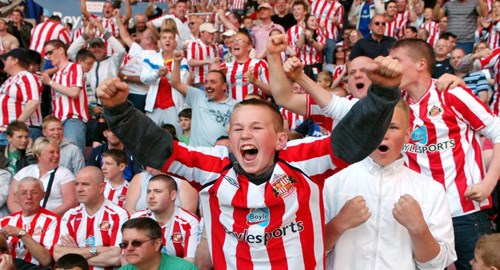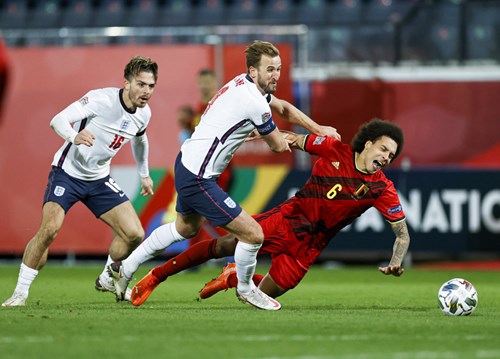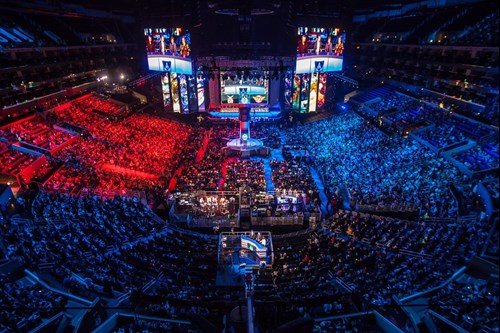Since The Football Association was founded in 1863, England has long been considered the home of football. The birthplace of the game, the nation’s number one sport, and home to the iconic Wembley Stadium – there is no doubt that football is a binding force that unites people across the country.
But this unification and sense of comradery is primarily reserved for club football, not country. This is where fans’ interest, as well as loyalty, lies. It is a long-debated, greatly contested topic, but for whatever reason, a Grosvenor Sport Survey found that 63% of fans claim their ultimate priority is their club, 23% said their passion was split equally, and only 14% maintained that supporting England took precedence.

While it’s not, as the statistics show, true of every football fan in England, there is a clear pattern of prioritising club over country. With England currently ranked fourth in the FIFA rankings, and the World Cup widely regarded as the most prestigious competition in sport, there must be more deep-rooted reasons as to why this remains the case – and why English fans differ from most in this respect.
A clear starting point is the frequency with which football clubs play compared to that of their country. From the Premier League to non-league football, it is the domestic leagues in England where fans pour their time and energy into on a weekly basis, emotionally investing in the players, the stadiums and the club itself.
On top of the domestic leagues sit a whole array of club competition; from the FA Cup which highlights the uniqueness of the English football pyramid, to the ominous Champions League where football’s elite battle it out, showcasing the very best of the game. These competitions, amongst others, have helped build club football into the powerful force it is today. By dominating the schedule to the extent that England fixtures are termed international ‘breaks’, and generally viewed as a burden that risk injuring a team’s key players, club football undoubtedly characterises and defines the game in England.
Fan loyalty is club-focused, and the sense of identity and belonging we can gain from football is more powerfully connected to club than country. Supporting England doesn’t only detract from this, but can at times contradict it. The poster boys for the FIFA World Cup in 2018, for example, were Harry Kane and Raheem Sterling, who played for and still represent Tottenham Hotspur and Manchester City respectively. Given the domestic rivalry between the clubs for whom these players represent, many fans struggled to dissociate them from their Premier League roles and therefore failed to view the set of players as a united team they could fully support.
England Euro2020!
— Booster99 (@betBooster99) June 2, 2021
Gareth Southgate announced his squad with four right backs!
How bad does England want to this trophy considering they will be playing their Croatia in the group stages whom they lost to in 2018 FIFA World Cup semi-finals.#Betbooster99 #99timebetter #Euro2020 pic.twitter.com/godVIkQDwA
In total, 22 of the 23 players chosen for England in 2018 were selected from Premier League clubs, so the association and representation of the league spread across the entire team. It can be difficult enough to suddenly invest in a group of players to whom your natural instinct is neutral – but if it’s even slightly, sub-consciously hostile, it becomes considerably harder.
Although not quite the context in which Eric Cantona intended it, perhaps the Manchester United star’s legendary quote is relevant here: “You can change your wife, your politics, your religion, but never, never can you change your favourite football team.”
Supporting England every now and then is, in a sense, re-defining who your football team is on a temporary basis. Even for fans of lower-league sides, who perhaps aren’t faced with the same tormenting challenge of supporting players from rival clubs, the process requires a complete re-adjustment of who your team is and why you’re supporting them.

But this is the case in almost all countries – domestic leagues exist separately from the national team, yet in few is club football prioritised over country as much as it is in England. This is perhaps due to the superior standards of football in club fixtures, which is relatively unique to England. The Premier League is widely regarded as the best football league in the world, and consistently showcases better quality of play than international matches between even the most talented countries. Watching England is, for some Premier League fans, accepting a stepdown in quality.
Yet for most countries this is not the case. In Croatia, for example, the quality of the national side, and the teams they compete against, far exceeds that of any club in their top domestic league. Croatia reached the final of the World Cup three years ago, knocking England out in the process, but the Croatian First Football League is only ranked 12th in Europe. No team from Croatia has ever won the Champions League.
Their star players, Luka Modrić and Ivan Rakitić, haven't competed in club football in Croatia for over a decade; both elected to play elsewhere, and are currently battling it out in Spain’s La Liga. Watching their national side is the only chance many Croatians have to support their nation’s best talent, and to watch more energising, electric football than their domestic leagues.
But the idea that international football represents a rare chance to watch your favourite players compete against the best in the world does not exist in England – we see it almost daily, taking it for granted no doubt, in the Premier League. From a pure quality perspective, there is no real incentive to watch international matches – they can often be uninspiring compared to the talent-fuelled dynamism of our domestic leagues.
On top of its high standards, the brutal competition and the wild unpredictability of the Premier League add to its allure. Its global following is uncontested, and its unique strength in depth has allowed clubs across the league to flourish. The league’s success is unprecedented. The same cannot be said, unfortunately, of England.
From the hope and expectation placed upon the young shoulders of the players at Euro ’96, to the revitalised ‘Golden Generation’ led by the likes of David Beckham, Steven Gerrard and Frank Lampard, England at major tournaments has been a tale of unfulfilled potential and uncomposed penalties. Consistently entering tournaments with a belief that this time will be different, only to be crushed further by agonising defeats, has worn down even the most dedicated fans.
Perhaps it would be a different story if one of those England sides had masterminded a victory. If England go on to win a major tournament, and what better opportunity than on home soil this summer, it would certainly spark life into the nation. The publicity for and popularity of the national team would skyrocket.
"I think that we have a great balance in the squad." 👊@PhilFoden on his new trim, competition for places and his #EURO2020 ambitions:
— England (@England) June 9, 2021
But could this break the deep-rooted, historical bonds fans have with their teams? Supporting domestic clubs, for whatever reason, appears to be more associated with authenticity and raw emotion than watching England. This may be due to traditionally non-football fans following England’s campaigns for reasons invariably disassociated with the game itself – the socialising, the competition, the spirit of the times. Club football, however, is primarily reserved for the ‘true’ fans of the game, who watch football for the sake of watching football.
However, and perhaps ironically, the top teams in English club football are considerably more commercialised than the England national side. The average cost of the most expensive match-day ticket in the Premier League increased by over 12% between 2011 and 2017, and continues to rapidly rise. Subscriptions to Sky Sports and BT Sport are needed to watch these games on television, whereas England matches are regularly broadcast by the BBC and ITV, demonstrating the comparative lack of commodification.
The recent controversies surrounding the European Super League perhaps best exemplify club football’s profit-driven, capitalistic agendas. The outroar it provoked in response, leading ultimately to the league’s destruction, may create a compelling story for fans, but the deeply destructive intention was there – and still is.
Fans’ general prioritisation of their club may be a direct result of this commercialisation. The Premier League has capitalised on technology’s influence on football through the Fantasy Premier League, which is particularly popular with younger fans. While there is an international equivalent for the World Cup, its relative infrequency ensures the online game has far less of a fanbase than those based on domestic leagues. The rise of eSports teams, club-specific documentaries and the concept of the fan experience, both in and beyond the stadium, are all modern extensions of the commercialisation of club brands.

Yet there remains a stubborn persistence that club football is somehow more organic and unscathed than the international game in England. Perhaps this hesitancy to fully invest in England and the perceived lack of ‘purity’ in supporting them is less connected with football itself, but stems from broader associations with the national side.
The English flag and the national anthem, for example, are both heavily associated with the team, but have uncomfortable connotations with sections of the public. It is almost impossible to disentangle English football from the politics that are ingrained in its history. The rising effects of nationalism in England and around the world, such as Brexit, are the latest instalment of this, creating a divide of opinion that can sometimes be difficult to overlook just because a football team pull on a shirt.
Whatever the intricate, inexplicable reasons, a large majority of fans pledge their loyalty to club over country. While the two aren’t mutually exclusive, and many supporters have an active interest in both, the prioritisation of club football perhaps reveals what matters most to fans. Rather than grand tournaments and homegrown players, it is the arbitrary, ever-changing footballers that come together at our beloved clubs we care most about – because these clubs represent far more than just the players themselves.

















